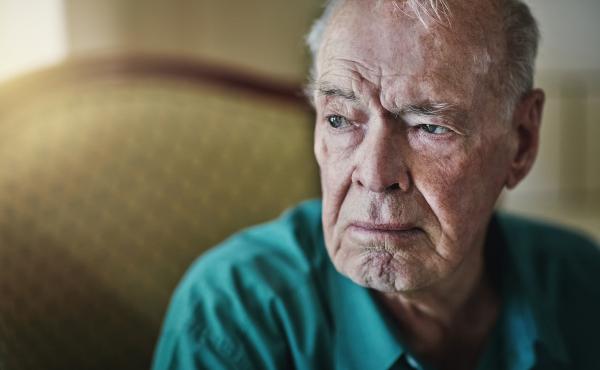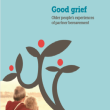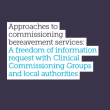Context
Going through a bereavement can be one the most challenging experiences of someone’s life. It can be a time of immense emotional, practical and even financial upheaval.
However, despite older people often going through more bereavements than any other age group, they are less likely to seek help with bereavement than younger age groups.
Death and bereavement are not subjects that are well recognised or prioritised within UK society. Where policy does exist, it is disparate and unconnected.
The bereavement sector itself is very fragmented, made up of many different providers and there is no one organisation with overall authority for bereavement. One of the most significant challenges that these organisations are facing is funding.
Our work
We began our policy work on bereavement in 2018 with the publication of Good Grief: Older people’s experiences of partner bereavement. This report draws together qualitative and quantitative research into older people’s experiences of partner bereavement and sets out some of the policy issues that must be addressed.
We have also produced a briefing which outlines the key findings from a Freedom of Information (FOI) request we submitted to every local authority and Clinical Commissioning Group (CCG) in England. This FOI was designed to look at the level of oversight and the extent of commissioning of bereavement services in England.
In 2021, we produced a research report which investigated older people’s attitudes towards and experiences of emotional support for bereavement
Our policy calls
- We are calling for a government-led strategy for the whole system of bereavement support that clarifies responsibilities and sets out a plan for how more investment will be secured. As part of this strategy, we would like to see a named bereavement lead within each integrated care system (ICS) structure and a named bereavement lead within NHS England.
- We want to see improved signposting to support options, especially for those in later life. Health and care professionals will play a key role in this signposting and should also be aware of the factors that may make an individual likely to need extra support after a bereavement. Beyond professionals, information about bereavement support should be readily available in all those places where people already spend time, such as supermarkets, libraries, hairdressers and faith centres.
- Activities that reconnect people and build up their social contact are a key part of an effective response to the challenge of bereavement for some people in later life. There should be greater recognition of the role that social prescribing can play in identifying where bereaved older people would benefit from accessing opportunities for more social connection. This should include ensuring link workers receive training on supporting bereaved older people. We also want to see funding for bereavement support providers to deliver training to voluntary and community sector organisations working to tackle loneliness, so that those organisations and their volunteers can support bereaved people with confidence.
- For a growing minority of people, bereavement is a trigger for a longer-term mental health problem that will require specialist support. However, there are still challenges accessing appropriate mental health support such as talking therapies for people aged over 65. To improve the uptake of the NHS talking therapies (IAPT) programme among older people, the Department of Health and Social Care, NHS England and ICSs should review the current barriers to accessing IAPT for people aged over 65, and work with the voluntary sector on targeted communication plans to increase the number of people in later life who receive this treatment. NHS England should also review local areas where access to IAPT services is higher for people aged over 65 and proactively share best practice examples with ICSs.



